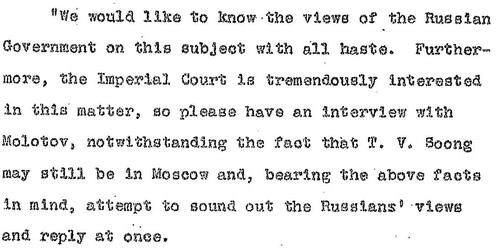
An excerpt from a July 12, 1945 US War Department summary of an intercepted cable from Japanese Foreign Minister Shigenori Togo to his ambassador to Russia
Posted on 08/06/2023 7:01:59 PM PDT by SeekAndFind
The anniversaries of the atomic bombings of Hiroshima and Nagasaki present an opportunity to demolish a cornerstone myth of American history — that those twin acts of mass civilian slaughter were necessary to bring about Japan’s surrender, and spare a half-million US soldiers who’d have otherwise died in a military conquest of the empire’s home islands.
Those who attack this mythology are often reflexively dismissed as unpatriotic, ill-informed or both. However, the most compelling witnesses against the conventional wisdom were patriots with a unique grasp on the state of affairs in August 1945 — America’s senior military leaders of World War II.
Let’s first hear what they had to say, and then examine key facts that led them to their little-publicized convictions:
General Dwight Eisenhower on learning of the planned bombings: “I had been conscious of a feeling of depression and voiced to [Secretary of War Stimson] my grave misgivings, first on the basis of my belief that Japan was already defeated and that dropping the bomb was completely unnecessary, and secondly because I thought that our country should avoid shocking world opinion by the use of a weapon whose employment was, I thought, no longer mandatory as a measure to save American lives. It was my belief that Japan was, at that very moment, seeking some way to surrender with a minimum loss of ‘face’.”
Admiral William Leahy, Truman's Chief of Staff: “The use of this barbarous weapon…was of no material assistance in our war against Japan. The Japanese were already defeated and ready to surrender because of the effective sea blockade and the successful bombing with conventional weapons.”
Major General Curtis LeMay, 21st Bomber Command: “The war would have been over in two weeks without the Russians entering and without the atomic bomb…The atomic bomb had nothing to do with the end of the war at all.”
General Hap Arnold, US Army Air Forces: “The Japanese position was hopeless even before the first atomic bomb fell, because the Japanese had lost control of their own air.” “It always appeared to us that, atomic bomb or no atomic bomb, the Japanese were already on the verge of collapse.”
Ralph Bird, Under Secretary of the Navy: “The Japanese were ready for peace, and they already had approached the Russians and the Swiss…In my opinion, the Japanese war was really won before we ever used the atom bomb.”
Brigadier General Carter Clarke, military intelligence officer who prepared summaries of intercepted cables for Truman: “When we didn’t need to do it, and we knew we didn’t need to do it…we used [Hiroshima and Nagasaki] as an experiment for two atomic bombs. Many other high-level military officers concurred.”
Fleet Admiral Chester Nimitz, Pacific Fleet commander: “The use of atomic bombs at Hiroshima and Nagasaki was of no material assistance in our war against Japan. The Japanese were already defeated and ready to surrender.”
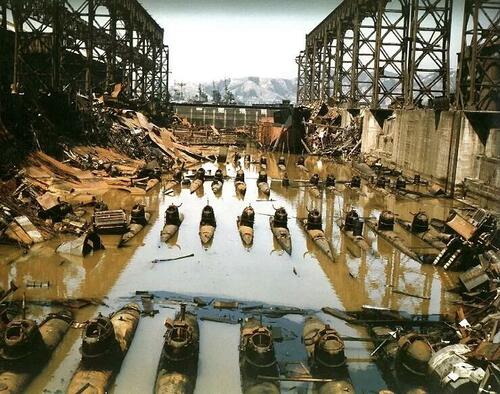
Putting out feelers through third-party diplomatic channels, the Japanese were seeking to end the war weeks before the atomic bombings on August 6 and 9, 1945. Japan’s navy and air forces were decimated, and its homeland subjected to a sea blockade and allied bombing carried out against little resistance.
The Americans knew of Japan’s intent to surrender, having intercepted a July 12 cable from Japanese Foreign Minister Shigenori Togo, informing Japanese ambassador to Russia Naotake Sato that “we are now secretly giving consideration to the termination of the war because of the pressing situation which confronts Japan both at home and abroad.”
Togo told Sato to “sound [Russian diplomat Vyacheslav Molotov] out on the extent to which it is possible to make use of Russia in ending the war.” Togo initially told Sato to obscure Japan’s interest in using Russia to end the war, but just hours later, he withdrew that instruction, saying it would be “suitable to make clear to the Russians our general attitude on ending the war”— to include Japan’s having “absolutely no idea of annexing or holding the territories which she occupied during the war.”
An excerpt from a July 12, 1945 US War Department summary of an intercepted cable from Japanese Foreign Minister Shigenori Togo to his ambassador to Russia
Japan’s central concern was the retention of its emperor, Hirohito, who was considered a demigod. Even knowing this — and with many US officials feeling the retention of the emperor could help Japanese society through its postwar transition —the Truman administration continued issuing demands for unconditional surrender, offering no assurance that the emperor would be spared humiliation or worse.
In a July 2 memorandum, Secretary of War Henry Stimson drafted a terms-of-surrender proclamation to be issued at the conclusion of that month’s Potsdam Conference. He advised Truman that, “if…we should add that we do not exclude a constitutional monarchy under her present dynasty, it would substantially add to the chances of acceptance.”
Truman and Secretary of State James Byrnes, however, continued rejecting recommendations to give assurances about the emperor. The final Potsdam Declaration, issued July 26, omitted Stimson’s recommended language, sternly declaring, “Following are our terms. We will not deviate from them.”
One of those terms could reasonably be interpreted as jeopardizing the emperor: “There must be eliminated for all time the authority and influence of those who have deceived and misled the people of Japan into embarking on world conquest.”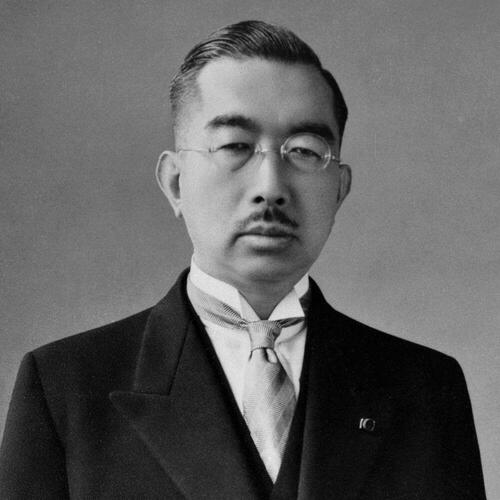
Japanese emperor Hirohito reigned from 1926 to 1989
At the same time the United States was preparing to deploy its formidable new weapons, the Soviet Union was moving armies from the European front to northeast Asia.
In May, Stalin told the US ambassador that Soviet forces should be positioned to attack the Japanese in Manchuria by August 8. In July, Truman predicted the impact of the Soviets opening a new front. In a diary entry made during the Potsdam Conference, he wrote that Stalin assured him “he’ll be in the Jap War on August 15th. Fini Japs when that comes about.”
Right on Stalin’s original schedule, the Soviet Union declared war on Japan two days after the August 6 bombing of Hiroshima. That same day — August 8 — Emperor Hirohito told the country’s civilian leaders that he still wanted to pursue a negotiated surrender that would preserve his reign.
On August 9, Soviet attacks commenced on three fronts. News of Stalin’s invasion of Manchuria prompted Hirohito to call a new meeting to discuss surrender — at 10 am, one hour before the strike on Nagasaki. The final surrender decision came on August 10.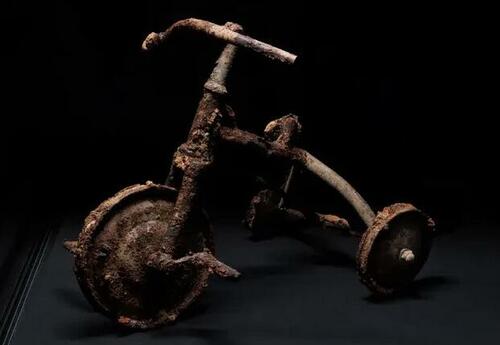
Three-year old Shinichi Tetsutani, burned as he was riding this tricycle when the atomic bomb hit Hiroshima, died a painful death that night (Hiroki Kobayashi/National Geographic)
The Soviet timeline makes the atomic bombings all the more troubling: One would think a US government that’s appropriately hesitant to incinerate and irradiate hundreds of thousands of civilians would want to first see how a Soviet declaration of war affected Japan’s calculus.
As it turns out, the Japanese surrender indeed appears to have been prompted by the Soviet entry into the war on Japan — not by the atomic bombs. “The Japanese leadership never had photo or video evidence of the atomic blast and considered the destruction of Hiroshima to be similar to the dozens of conventional strikes Japan had already suffered,” wrote Josiah Lippincott at The American Conservative.
Sadly, the evidence points to a US government determined to drop atomic bombs on Japanese cities as an end in itself, to such an extent that it not only ignored Japan’s interest in surrender, but worked to ensure that surrender was delayed until after upwards of 210,000 people — disproportionately women, children and elderly — were killed in the two cities.
Make no mistake: This was a deliberate targeting of civilian populations. Hiroshima and Nagasaki were chosen because they were pristine, and could thus fully showcase the bombs’ power. Hiroshima was home to a small military headquarters, but the fact that both cities had gone untouched by a strategic bombing campaign that began 14 months earlier certifies their military and industrial insignificance.
“The Japanese were ready to surrender and it wasn’t necessary to hit them with that awful thing,” Eisenhower would later say. “I hated to see our country be the first to use such a weapon.”
According to his pilot, General Douglas MacArthur, commander of US Army Forces Pacific, was “appalled and depressed by this Frankenstein monster.”
“When I asked General MacArthur about the decision to drop the bomb,” wrote journalist Norman Cousins, “I was surprised to learn he had not even been consulted…He saw no military justification for the dropping of the bomb. The war might have ended weeks earlier, he said, if the United States had agreed, as it later did anyway, to the retention of the institution of the emperor.”
What then, was the purpose of devastating Hiroshima and Nagasaki with atomic bombs?
A key insight comes from Manhattan Project physicist Leo Szilard. In 1945, Szilard organized a petition, signed by 70 Manhattan Project scientists, urging Truman not to use atomic bombs against Japan without first giving the country a chance to surrender, on terms that were made public.
In May 1945, Szilard met with Secretary of State Byrnes to urge atomic restraint. Byrnes wasn’t receptive to the plea. Szilard — the scientist who’d drafted the pivotal 1939 letter from Albert Einstein urging FDR to develop an atomic bomb — recounted:
"[Byrnes] was concerned about Russia's postwar behavior. Russian troops had moved into Hungary and Rumania, and Byrnes thought it would be very difficult to persuade Russia to withdraw her troops from these countries, that Russia might be more manageable if impressed by American military might, and that a demonstration of the bomb might impress Russia."
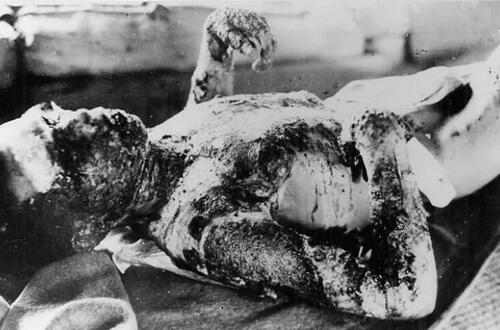
Whether the atomic bomb’s audience was in Tokyo or Moscow, some in the military establishment championed alternative ways to demonstrate its power.
Lewis Strauss, Special Assistant to the Navy Secretary, said he proposed “that the weapon should be demonstrated over… a large forest of cryptomeria trees not far from Tokyo. The cryptomeria tree is the Japanese version of our redwood… [It] would lay the trees out in windrows from the center of the explosion in all directions as though they were matchsticks, and, of course, set them afire in the center. It seemed to me that a demonstration of this sort would prove to the Japanese that we could destroy any of their cities at will.”
Strauss said Navy Secretary Forrestal “agreed wholeheartedly,” but Truman ultimately decided an optimal demonstration required burning hundreds of thousands of noncombatants and laying waste to their cities. The buck stops there.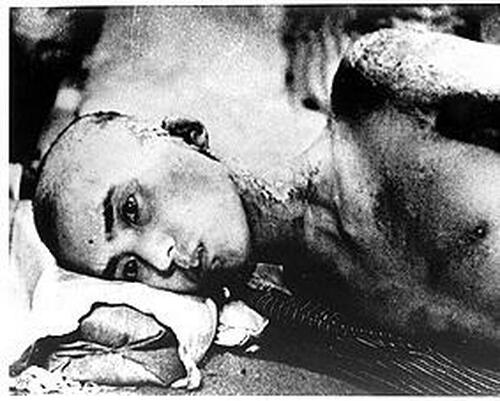
A victim of the atomic bomb
The particular means of inflicting these mass murders — a solitary object dropped from a plane at 31,000 feet — helps warp Americans’ evaluation of its morality. Using an analogy, historian Robert Raico cultivates ethical clarity:
“Suppose that, when we invaded Germany in early 1945, our leaders had believed that executing all the inhabitants of Aachen, or Trier, or some other Rhineland city would finally break the will of the Germans and lead them to surrender. In this way, the war might have ended quickly, saving the lives of many Allied soldiers. Would that then have justified shooting tens of thousands of German civilians, including women and children?”
The claim that dropping the atomic bombs saved a half-million American lives is more than just empty: Truman’s stubborn refusal to provide advance assurances about the retention of Japan’s emperor arguably cost American lives.
That’s true not only of a war against Japan that lasted longer than it needed to, but also of a Korean War precipitated by the US-invited Soviet invasion of Japanese-held territory in northeast Asia. More than 36,000 US service members died in the Korean War — among a staggering 2.5 million total military and civilian dead on both sides of the 38th Parallel.
We like to think of our system as one in which the supremacy of civilian leaders acts as a rational, moderating force on military decisions. The needless atomic bombing of Hiroshima and Nagasaki — against the wishes of World War II’s most revered military leaders — tells us otherwise.
Sadly, the destructive effects of the Hiroshima myth aren’t confined to Americans’ understanding of events in August 1945. “There are hints and notes of the Hiroshima myth that persist all through modern times,” State Department whistleblower and author Peter Van Buren said on The Scott Horton Show.
The Hiroshima myth fosters a depraved indifference to civilian casualties associated with US actions abroad, whether it’s women and children slaughtered in a drone strike in Afghanistan, hundreds of thousands dead in an unwarranted invasion of Iraq, or a baby who dies for lack of imported medicine in US-sanctioned Iran.
Ultimately, to embrace the Hiroshima myth is to embrace a truly sinister principle: That, in the correct circumstances, it’s right for governments to intentionally harm innocent civilians. Whether the harm is inflicted by bombs or sanctions, it’s a philosophy that mirrors the morality of al Qaeda.
That’s not the only thread connecting 1945 to 2023, as Truman’s insistence on unconditional surrender is echoed by the Biden administration’s utter disinterest in pursuing a negotiated peace in Ukraine.
Today, confronting an adversary with 6,000 nuclear warheads — each a thousand times more powerful than the bombs dropped on Japan — Biden’s own stubborn perpetuation of war puts us all at risk of sharing the fate of Hiroshima and Nagasaki’s innocents.
My Dad who was stationed in the Pacific and was in Hiroshima 6 weeks after the bomb once told me that if they had had to storm the Japanese beach heads we would have lost another 500,000 men.
You post this crap with no comment
My Japanese stepdaughter had the opportunity to talk with both her grandmothers about this. Both wanted the war to end and were thankful when it did. Support for the war seemed to vary for different parts of the country. Both grandmothers lived in rural areas (one in Nambu, one in Inokashira - which are both about 40-45 minutes from Fujinomiya). Relatives in Shizuoka proper were more strident even though that city was badly damaged by Allied bombing.
I was 13 when the bomb was dropped………the adults in my neighborhood were delighted because it ended the war.
….
Indeed. All of the scientists were on board. I know this because my family was there. One of them was a 21 year old who was given sole responsibility for the design and computations for one component of the bomb. He would later work with Teller and Samuel Cohen on the hydrogen and neutron bombs respectively. In ‘48 it was he who informed Truman that the Soviets were weeks away from testing their bomb and stationing an observatory In Alaska was needed. Under Reagan he led the study advising going forward with the Strategic Defense Initiative (Star Wars) which forced the Soviets to compete financially eventually leading to bankrupting them. Revisionists are evil in the most Biblical sense.
Why does that bother you?
Precisely
His father (and yours...and mine as well) were three of those men who might never have come home from an invasion of Japan.
On a related note, every year, my father would give a Memorial Day speech in his hometown.

This picture was from 1995, which was also the year of the 50th anniversary of the dropping of the bombs.
My father had very strong feelings about the use of the Atomic Bomb, and in that speech in the town square after the parade he brought up the subject because it was all the rage in the news to talk about the racism, inhumanity, and needlessness of the use of the bomb, and it made him pretty mad.
I don't have a transcript of his speech, but...in it, he said something like "There is a lot of controversy about it today, but not from me. If we had more of them and earlier, we should have dropped them and kept dropping them until they surrendered."
The next day in the local paper, under the picture I posted above, it said something like "WWII Veteran Says America Should Have Dropped More Bombs"
My dad was solidly unrepentant. He didn't care what people said about him.
And neither did I.
” but it was LeMay who crippled the homeland’s military machinery. “
Childish. LeMay was angry about the bomb because his firebombing was overshadowed by the nukes. And it was a very joint thing. The NAVY killed manufacturing as much as the B-29s did. US Navy subs utterly strangled them. And without Navy and Marines, the B-29s had no Marianas bases. No Iwo Jima fighter bases.
Without the Navy, Lemay was helpless.
Precisely
Ike spent the whole war in the ETO. Would anyone ask MacArthur his opinion of the war in Europe. Ike was wrong if serious. But he was it was a later political sop to make Japan feel good about being an ally.
Larry Schweikart’s post from earlier today, from here:
https://freerepublic.com/focus/chat/4173267/posts?page=5#5
Everything you need to know about the dropping of the atomic bomb can be found in Richard Frank’s book, “Downfall.” He had access to Japanese, as well as American, archives & memoirs as well as the post-war recollections of Emperor Hirohito.
*Casualty projections were all over the map, from 100,000 to 1 million for the US, up to 10 m for the Japanese.
*Ketsu-Go, the Japanese plan for national suicide, was already being put in place and civilians given what equipment there was and training as to how to become bushido jihadist suicide bombers. They were totally down with it, as seen in the suicide bomber #s on Okinawa. The plan for “one man, one ship” exchange was fully in place. Suicide torpedoes were already being built.
*Through Okinawa, the number of Japanese troops who surrendered, despite obvious evidence their units were destroyed and they had no hope of winning, was almost ZERO. On Iwo Jima, fewer than 2,000 prisoners (almost all wounded) were taken out of a garrison of 20,000. There was no evidence, anywhere, that the Japanese civilians on Hokkaido or any other island would actually surrender.
*Here’s the amazing thing about the numbers: everything Truman saw was really, really LOW. He never was briefed on total air, infantry, support, naval casualties, or those of just ordinary but predictable accidents. Thus he decided on the LOWER estimates.
*As late as 2 days after the Hiroshima bomb, Japanese council records show that the council was split on whether to accept the Potsdam Agreement (it took unanimous consent to do anything).
*The government sent Dr. Nishina to Hiroshima to confirm it was an atomic bomb. When he did, he was asked, “How long til we can get one?”
*The Soviets entering the war was important for two reasons: First, it ended the fantasy that Japan could reinforce the home islands with China-based troops, and second, it ended any hope that the Japanese could get the Russkies to pressure us to accept anything less than “unconditional surender.”
*Finally, the decision to retain the emperor ran COUNTER to all US public opinion polls. It was taken because MacArthur and Nimitz thought it would be easier to disarm and control the civilians if the emperor went along with the plan.
*Even after Hirohito decided (following the Nagasaki bomb) to surrender, groups of “dead-enders” tried to assaswinate him and put a harder line guy in.
Many of the quotes are in this document.
https://www.govinfo.gov/content/pkg/CREC-2012-09-19/html/CREC-2012-09-19-pt1-PgH6128-2.htm
I agree. It is a form of fundamental un-truth and deception. I despise it utterly.
On a personal level, I have tried to face the things our country has done that are less than laudable, and there are many of them.
I try to stare those things in the face and accept them, good or bad.
I always felt the was a great country.
But it wasn't just all the "good" things we did that ended up making it great.
It was the totality, both good and bad, that has made America what it became.
Just as it is with individual people. None of us are who we are, for better or worse, without those things we would rather not remember.
But, this despicable cowardice, this inability of people to accept and face up to this, resulting in the tearing down of monuments and such other revisionist activities, fills me with rage.
And one of the worst things is impressing our values of today on people who made decisions in 1945...never mind 1775 and 1861.
If I were the CinC, my axiom for all conflicts is to minimize American casualties, no matter the cost to the other nations. If American troops had to invade Japan proper there would be significant U.S. casualties. That did not happen because of the bombs.
Contrast my warmonger side with my inner dove. The peace loving side of me is very strong. It takes egregious actions by another nation to flip the switch from peace to war. Diplomacy is paramount and only when that fails does the switch to war happens. It takes a significant attack and loss of American lives to begin a hot war, and even then diplomacy should continue until peace is obtained. It takes an unconditional surrender to end American attacks. No cease fires, no decrease in operations, attacks continue to the moment a surrender occurs. We get it over as quickly as possible.
That minimizes American loses. I don’t care about the other side since we should never be in the situation where we start a war. We don’t start wars, we end them. Unfortunately, that has not been the case in recent history and I am ashamed because of that.
Because it’s pointless. Either they have a point of view or the don’t. If they don’t no reason to post it here
The Japanese didn’t surrender after Tokyo was firebombed. They didn’t surrender after Hiroshima. The argument for a demonstration of the power on an uninhabited island was floated. But nixed cause if they told the Japanese where and when, the fear was that JApan would move American POW’s there to be obliterated. The article talks about decimating a forest. Yeah...that would work.
Japan had its own research on atomic power...but not too advanced as we found out AFTER the war. In the book HIROSHIMA by Hersey...he recounts that the explanation the JApanese used to explain the bright flash was that Magnesium was dropped on the high power lines to create the flash.
If we invaded Japan, hundreds of thousands of Americans . and millions of Japanese would have been killed.
Seeing the power of the A-bomb helped prevent further war by the doctrine of MAD.(mutually assured destruction)
The article is a lie written by someone who knows that history can be falsified. Complete idiot for trying.
LeMay had burned out over 35% of most major cities with his firebombing tactics. They could have done it without the atomic bomb, just not as quickly.
Plus McArthur really wanted to invade to on up Ike and be the biggest of big dogs.
Here's the Advisory Board list they have on their website:
Hafsat Abiola
Christine Ahn
Tadatoshi Akiba
Medea Benjamin - Code Pink founder
Helen Caldicott, M.D.
M.D.Noam Chomsky, Ph.D.
Jean-Michel Cousteau
Michael Douglas
Shirin Ebadi, J.D.
Anne H. Ehrlich, Ph.D.
Paul R. Ehrlich, Ph.D.
Riane Eisler, J.D.
Daniel Ellsberg, Ph.D
Beatrice Fihn
Harrison Ford
Johan Galtung, Dr. hc mult
Jane Goodall, Ph.D, DBE
Ira Helfand, M.D.
Bianca Jagger
Marc Kielburger, J.D.H.H.
the 14th Dalai Lama
Rev. James Lawson
Robert Jay Lifton
Mairead Corrigan Maguire
Judith Mayotte, Ph.D.
Gloria R. Montebruno Saller, Ph.D.
John Polanyi
Queen Noor of Jordan
Admiral L. Ramdas
Hon. Douglas Roche, O.C.
Elaine Scarry, Ph.D.
Robert Scheer
Gerry Spence, J.D.
Oliver Stone
Noel (Paul) Stookey
Setsuko Thurlow
Ted Turner
Peter Yarrow
I didn't realize that Mary Travers from Peter, Paul, and Mary had passed, so it's only Peter and Paul. Yarrow was arrested in 1970, and convicted for taking sexual liberties with a 14 year old girl after she and her 17 year old sister showed up at his hotel room. He did three months of a 1-3 prison sentence. Jimmy Carter pardoned him in 1981.
With some of the names on that list, I wouldn't trust this group as far a I could throw them.
Yep.
Disclaimer: Opinions posted on Free Republic are those of the individual posters and do not necessarily represent the opinion of Free Republic or its management. All materials posted herein are protected by copyright law and the exemption for fair use of copyrighted works.